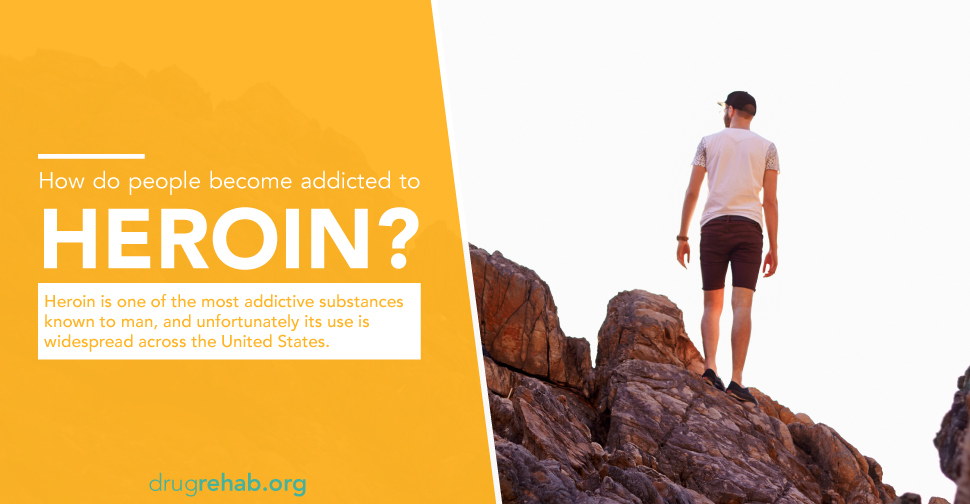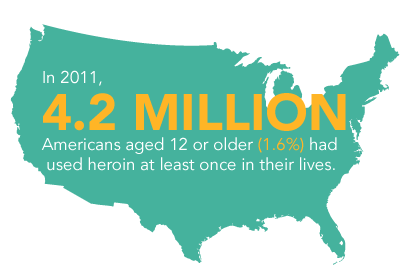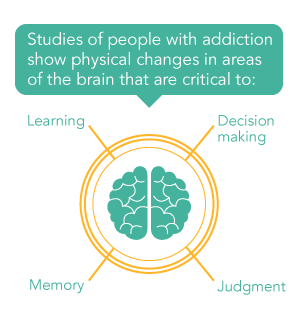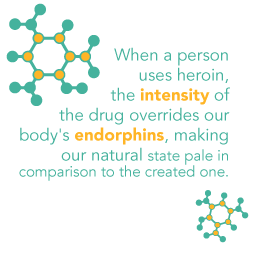
Heroin is one of the most addictive substances known to man, and unfortunately its use is widespread across the United States. According to the National Institute on Drug Abuse (NIDA), “In 2011, 4.2 million Americans aged 12 or older (or 1.6 percent) had used heroin at least once in their lives. It is estimated that about 23 percent of individuals who use heroin become dependent on it.”

Heroin is within the opioid class of drugs, as a synthetic that is derived from morphine. Heroin comes in several forms, namely powder (either brown or white), or in a sticky form, called “black tar heroin.” All hold great potential for addiction. In order to better comprehend the repercussions of addiction, we need to understand the means by which a person got there.
Why Do People Use Heroin?
People come from all walks of life; each individual has specific experiences, battles, thoughts, and behaviors that can create and foster their drug addiction.
Generally, when most people use heroin, they are seeking the intense euphoric effect that it creates. Heroin is taken via three routes: through smoking, intravenous injection, or inhalation, specifically by snorting or sniffing it. All three of these deliver a rapid and potent high, which is the main reason why people favor this drug.
In addition to its euphoric effects, heroin can dull the senses, including that of pain, this is called analgesia. The drug may lead a person to feel removed from the world around them, including a perceived absence from any portent problems, and it may also lead a person to experience a sense of contentment, or false wellbeing. Some people may gravitate towards this drug to experience these things as they stand, or as a means of self-medication. On top of this, the price of heroin has dropped, and its prevalence has skyrocketed, making it more obtainable to those that seek these effects.
Why Is Heroin So Addictive?
The first time a person uses is typically by choice, however, as the drug use gains momentum, a person is unable to oversee their self-control and dictate the decisions regarding this use, which is characteristic of an addiction. According to NIDA, “Brain imaging studies of people with addiction show physical changes in areas of the brain that are critical to judgment, decision making, learning and memory, and behavior control. Scientists believe that these changes alter the way the brain works and may help explain the compulsive and destructive behaviors of addiction.”

Foremost, heroin’s capacity for addiction begins with its administration. All three venues of use lead the user to feel the drug’s effects quickly. In the case of intravenous users, a rush may be present before it subsides to the high. The reason why this high is so rapid is because of the drug’s potency paired with these delivery methods. Due to this, it very quickly crosses the blood-brain barrier, leading to this fast and intoxicating high.
Now we must understand the drug’s chemical components along with your body’s physical and physiological interactions with heroin. When you use heroin, your body is flooded with the opiate, it overwhelms your body’s system and is put in a unique place to affect the workings of your brain.
What is interesting about this process, as explained by NIDA, is that when you use heroin, it actually converts back into morphine—another powerful opiate. It is this drug that seeks out the opioid receptors that are present throughout your body and brain. These receptors help to dictate your awareness and experience of pain, and are also elemental in your reward systems. Though our bodies are designed to encounter activation within these receptors, they were never intended to bear the weight of this chemical form and intensity.
 The structural components of morphine are somewhat similar to endorphins, which are our body’s naturally-occurring feel-good chemicals. When a person uses heroin, the intensity of the drug overrides our body’s endorphins, making our natural state pale in comparison to the created one. For this reason, as a person quickly learns that they can control these feelings, they become motivated to use more and more, in order to further generate these feelings of pleasure or analgesia.
The structural components of morphine are somewhat similar to endorphins, which are our body’s naturally-occurring feel-good chemicals. When a person uses heroin, the intensity of the drug overrides our body’s endorphins, making our natural state pale in comparison to the created one. For this reason, as a person quickly learns that they can control these feelings, they become motivated to use more and more, in order to further generate these feelings of pleasure or analgesia.
As part of this process, areas of your brain’s limbic reward system kick into overdrive. The heroin, now morphine, causes an excess production of a chemical called dopamine, which is an important neurotransmitter that is responsible for sending messages and signals across regions of the brain.
It is also tasked with creating feelings of pleasure and a sense of reward. It acts on the receptor sites that spoken about above, and eventually, as a person increases their use, these sites are overstimulated and essentially forget how to work on their own without the presence of the drug. This is what causes tolerance and dependence, and symptoms of withdrawal when use is ceased.
One study outlined the impact that these changes within the brain have on cravings. It spoke about how certain areas of the brain form memories that are specific to the attachment between the hallmark feelings of pleasure and the circumstances that created them. Specifically it stated that “These memories, called conditioned associations, often lead to the craving for drugs when the abuser re-encounters those persons, places, or things, and they drive abusers to seek out more drugs in spite of many obstacles.”
As a person’s body comes to rely on heroin as a mechanism for chemical change, their body’s physiology begins to experience modifications, which transition spurs a person towards addiction.
The Emergence Of A Tolerance And A Dependence
As a person uses more drugs, they find that they need more to achieve the same effects that a lower dose granted; this is called a tolerance. Eventually, they may develop a dependence, which means that their body and brain have come to rely on the drug to moderate and alter its functions. Both of these things further the propensity towards addiction.
Though heroin doesn’t leave your body as fast as some drugs, its effects do wane fairly quickly—a user may begin to experience withdrawal symptoms in as little as a few hours after the last dose. This is another reason why individuals that are already dependent may increase their level of addiction, as they encounter intolerable and even painful side effects of withdrawal, they may be apt to use more of the drug to alleviate and avoid these symptoms. This can develop into a compulsive need that may lead to an addiction. Though a first time user may not experience full on withdrawal, they may still encounter uncomfortable feelings that urge them towards more use.
What Are The Dangers Of A Heroin Addiction?
Using heroin is like playing with fire; you’re liable to encounter pain and measures of destruction. Heroin exerts a very heavy toll on a person’s life, it can disrupt their relationships, finances, job standing, and school ambitions.

It can severely damage a person’s body and mind, leading to such problems as collapsed veins, increased risks of infectious disease (this risk is especially high for those that use intravenously), complications during pregnancy, brain damage, damage to other vital organs, overdose, coma, and death, among other risks. Some research even shows that certain areas of the brain begin to deteriorate, creating cognitive impairment.
Are There Treatments For Heroin Addiction?
Yes, even though it may be a tough road, compassionate and expert care exists to treat a person who is suffering from heroin addiction. With any substance abuse or addiction, the best rehabilitation programs offer comprehensive protocols that integrate a variety of treatments and therapies. These not only help you to gain sobriety, but maintain it in the time after you leave rehabilitation.
Effective rehabilitation should address any co-occurring disorders that may aggravate or precipitate substance abuse, and utilize medication-assisted treatment. Methadone, buprenorphine, and naltrexone are medications that may be used to treat heroin addiction.
These therapies may include cognitive behavioral therapy—an intensive method that assists a person in breaking harmful cycles revolving around negative thoughts and behaviors—or contingency-management and motivational incentives, which are incentive-based methods that help to support positive achievements and abstinence.
We Can Help You Overcome Your Addiction
 Though it is true that this can be one of the most difficult addictions to beat, it is not impossible. With the right help and treatment program, you or your loved one can achieve wellness and sobriety, and maintain a lasting recovery, free from the risks and damages of a heroin addiction. Contact us and speak with our experts today at DrugRehab.org to find out how you can make this a reality.
Though it is true that this can be one of the most difficult addictions to beat, it is not impossible. With the right help and treatment program, you or your loved one can achieve wellness and sobriety, and maintain a lasting recovery, free from the risks and damages of a heroin addiction. Contact us and speak with our experts today at DrugRehab.org to find out how you can make this a reality.
For More Information Related to “How Do People Become Addicted to Heroin?” Be Sure To Check Out These Additional Resources From DrugRehab.org:
- Common Street Names For Illegal Drugs
- How Do I Get My Loved One Into Rehab?
- Heroin and Opioid Addiction Statistics
- Environmental Risk Factors for Developing an Addiction
- Heroin Addiction And Depression
- Heroin Mixed With Fentanyl Causing Overdoses
- What is Heroin Cut With?
Sources
National Institute on Drug Abuse – DrugFacts: Heroin
National Institute on Drug Abuse – Drug Abuse and Addiction
National Institute on Drug Abuse – Drugs and the Brain
University of Colorado Boulder – Neuroanatomy and Physiology of the “Brain Reward System”in Substance Abuse
National Institute on Drug Abuse – Contingency Management Interventions/Motivational Incentives (Alcohol, Stimulants, Opioids, Marijuana, Nicotine)
